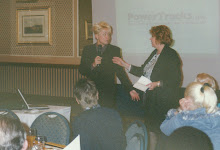There’s a job crisis going on alright but, for many, not for the reasons you may think.
No doubt there are fewer jobs today and if you are looking for a “job”, you could certainly run into roadblocks. Yes, it is frustrating to spend hours writing cover letters, revamping your resume, and sending it all to recruiters and companies, often receiving little more than a cursory acknowledgment via email. I do believe this is happening and empathize.
I then read Stephen Viscusi’s online article (posted on The Ladders), Why You're Still Unemployed One Year Later and a Q & A on LinkedIn for the question: Are Recruiters still getting 100s of resumes for job openings? Viscusi’s article is an in-your-face dose of reality about why he believes someone may be unemployed for an extended period while the people posting to LinkedIn’s Q & A offer a different take.
Viscusi’s view: If you’re unemployed it is because your attitude stinks.
General consensus from LinkedIn’s Q & A: Many people are applying for jobs for which the HR person or recruiter has deemed you wholly unqualified to perform.
Though, for the latter, and as a contributor to LinkedIn’s Q & A, Jonathan Lome, from Human Capital Management - ACA Talent put it quite succinctly:
I have definitely seen an increase in people applying for open positions, and I have also noticed more and more people applying to positions who completely lack the skills sets the position requires. I think that these days, people are not necessarily looking for a career (although many claim they are), instead they are looking simply for a job to pay the bills, so they apply to whatever they see open.
Pay attention to Jonathan, people, because he hit the nail on the head when stating that many people are looking for a job instead of a career; which may also explain Viscusi’s argument that after a long time looking for a job instead of career your attitude can begin to rot when you can’t find a “job”. The problem, however, is that “a job” and “a career” are frequently considered the same thing. They aren’t. But, if you don’t know the difference, how do you go about finding either one?
Well, for starters, get educated on the differences. Are you looking for something, as Jonathan wrote, just to “pay the bills”, or do you want to become part of an organization where your interests, skills, and talents are exactly what are needed by very specific employers? (Note: No matter how brilliant you may be in one arena, this does not mean you can automatically perform any arena.) This is where understanding a key difference between a job and a career can really help: For a job, you can learn the skills, on-the-job, to perform the work. Depending on the complexity of the job, it may take you days or weeks before you learn enough to make an impact on the company. For a career, it is years of prior learning and honing your skills that will make a near-immediate impact on the hiring company. (For beginning careerists, of course, you often have to take a lot of 'jobs' before your work-life shapes up as a career.)
The second and, perhaps, most difficult thing to get past in finding your right work-life, be it job or career, is trusting that you can get exactly what you want; even in this economy. But you need laser-like focus to achieve this. You must shut-down the internal chatter that tells you all the reasons why you can’t get what you want and trust, simply trust, that what you put your attention on will grow. Don’t believe me? Well, consider the more you fret about not finding the right work, the more you don’t find it. This principle also works in the reverse, in a positive way.
What do you have to lose?
Executive Onboarding Note: The Importance Of The Confidence To Be Open To
Help
-
While executive onboarding, get help. If it’s offered, take it. If it’s not
offered, find it.
The post Executive Onboarding Note: The Importance Of The C...
7 years ago



